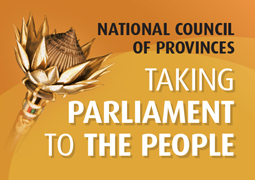
In an ongoing effort to advance the effectiveness of oversight through the Taking Parliament to the People programme, the National Council of Provinces (NCOP) continues to hold report-back sessions on the programme to make sure that government implements the recommendations and to give feedback to the affected communities.
The next report-back session of the programme will be held from 12 – 16 March in the Buffalo City Metropolitan Municipality and Alfred Nzo District in the Eastern Cape, almost two years after the Taking Parliament to the People was held there.
Through this flagship programme of “Taking Parliament to the People”, the NCOP has enhanced its oversight mandate and continued to push government to speed up the delivery of services especially in the historically disadvantaged areas.
The NCOP has, through the programme over the years, uncovered huge backlogs in delivery of basic services and heard about numerous reports of corruption, bribery, nepotism, maladministration, inefficiency, poor communication and leadership, under spending (which results in incomplete projects) and lack of infrastructure maintenance in that province.
In 2016 the NCOP together with the Eastern Provincial Legislature conducted oversight visits to the following local municipalities under Alfred Nzo District: Matatiele, Mbizana, Umzimvubu and Ntabankulu, on a pre-visit, and a month later the main Taking Parliament to the People was held at Buffalo City where citizens interacted with ministers and mayors as well as witnessing a formal sitting of the NCOP which was addressed of the President of the country.
During its visit to the province the NCOP delegates were joined by Members of the Eastern Cape Provincial Legislature and those from other legislatures, to conduct oversight to several schools, healthcare centres, agricultural projects, institutions of higher education and correctional services centres.
The NCOP also held public hearings where citizens freely spoke about service delivery issues affecting their community, and these included poor roads infrastructure, shoddy built RDP houses, asbestos structures in some schools and lack of classrooms, among others.
Residents urged the NCOP to get government to enforce compliance with the existing policies on local procurement, in order to help local companies to create more jobs and grow the economy of the country.
After collecting the information, the NCOP compiled a report and where necessary call for interventions by national ministers.
The report was debated in an NCOP parliamentary sitting which saw participation my members of the South African Local Government (Salga) as well as MECs from provinces.
In its report the NCOP has recommended that government should build proper brick structures for classrooms, offices, offices and outdoor recreational facilities
The report with recommendations was also shared with relevant provincial and national departments for implementation, and in March the NCOP will spend a week in the province to follow-up on the recommendations.
Since its inception in 2002, the Taking Parliament to the People has evolved from being an ordinary public participation platform to be the best oversight and service delivery tool.
Taking Parliament to the People provides a platform for public participation enables interaction between ordinary people and their government representatives on service delivery and governance issues affecting communities.
The African Peer Review Mechanism Country Review of South Africa cited Taking Parliament to the People as one of the best practices when it comes to the promotion of democracy and political governance.
It allows Parliament to assess the impact of the legislation it has passed on the development and empowerment of the people and also helps promote transparency and accountability.
According to the Chairperson of the NCOP, Ms Thandi Modise, Taking Parliament to the People programme is an instrument for the NCOP to enhance its engagement with the public and it also allows people to have a say in how they experienced governance.
“The advantage of the programme is that it involves the participation of the three spheres of government. This is our contribution to promoting co-operative government. The programme assists us to get an understanding of the challenges that our people face in the different corners of our provinces,” she said.
Through the programme, the NCOP has been successful in pushing government to speed up delivery of services especially in rural areas.
Ms Modise said the programme continues to be an important oversight tool and a platform for communities to raise governance issues and get immediate response from the executive.
“It continues to be a programme that avails Parliament to everybody, it is the spokesperson for the ordinary people which mediates and intervenes on service delivery and inter-governmental relations,
“It also provides an opportunity for the pubic to raise issues that would take years to raise through writing letters and petitions,” said the Chairperson.
She said through the programme Parliament has seen and ensured that provincial and national executive do what they undertake to do in front of the people.
By Sakhile Mokoena
8 March 2018

